If you’re often leaving the comfort of your home for new adventures in foreign countries, having a VPN by your side is imperative. While abroad, you’ll encounter geo-restrictions that will prevent you from accessing the local content in your country.
In addition, you never know the privacy laws of the country you’re in and the degree of government surveillance that infringes on your privacy. Not only that but oftentimes, public Wi-Fi networks are unsafe to use and will expose your IP address to anyone in proximity.
A quality VPN for traveling comes into play here, though. It’ll encrypt your connection, hide and replace your IP address, and allow you to soar the internet safely, anonymously, and without geo-restrictions.
Regardless of your location, you’ll be able to watch Netflix, access your local bookies abroad, or bypass censorship in countries like China or Russia. However, not every provider is a good VPN for travel, so you must ensure you get a dependable choice.
The 5 best VPNs to use when traveling:
- NordVPN
- ExpressVPN
- CyberGhost
- Surfshark
- Private Internet Access
7492 servers
118 covered countries
30 days money-back guarantee
10 simultaneous connections
3000 servers
105 covered countries
30 days money-back guarantee
8 simultaneous connections
12000 servers
100 covered countries
45 days money-back guarantee
7 simultaneous connections
3000 servers
100 covered countries
30 days money-back guarantee
Unlimited connections

27000 servers
91 covered countries
30 days money-back guarantee
Unlimited connections
Why You Should Use a VPN When Traveling
Before I talk about my favorite VPNs for traveling abroad, let me first clarify why you should use one. Although I mentioned a few reasons, I want to go in-depth, just to make sure you’re getting an accurate picture.
Maintaining Online Privacy
The #1 issue with international traveling is getting in touch with the country’s laws. And here, I’m referring to privacy laws that often aren’t as respectable as you think they are. Most countries are using ISPs to spy on your online activities and learn more about your online habits.
This practice is known to bother many people who simply want to enjoy the internet without anyone breathing behind their necks. The good thing is that a VPN service allows you just that, effortlessly, and with a single mouse click.
Once you connect to a VPN server, your connection is encrypted, meaning that no one can read its content. From that moment, everything you do online remains known only to you, preventing ISPs, hackers, and government bodies from tracking your activities.
Staying Safe on Public WiFi Networks
Speaking of security and privacy, let’s talk about public Wi-Fi. Even an uninformed person can conclude that public WiFi networks are all but secure, and due to the lack of encryption, even an amateur hacker can breach it and steal people’s personal information.
The worst part about it is that you won’t even notice it. That’s because all devices on that network share the same public IP, which, if intercepted, can be used to access credit card info, passwords, and other sensitive information on each of the devices.
And you know what? Public places like restaurants, cafes, and hotels made for tourists are the best places for such activities! With hundreds of people passing by each day, hackers can easily steal personal information without breaking a sweat.
With a VPN that gives you additional encryption and masks your IP address, you’ll be safe from this terror. Thanks to encryption, even if hackers intercept your connection (which is impossible!), they’ll see a garbled mess, with no information about your original IP.
Bypassing Geo-Restrictions
One thing I hate about traveling is losing access to local content in my country. This is especially annoying if you started watching a show on your native Netflix catalog, just to lose access to it as soon as you leave the borders of your country.
The same applies to many other geo-restricted platforms, online bookies and casinos (see our article on how to play on Stake), or local TV channels. In most cases, they’re geo-restricted to certain regions, preventing you from accessing them in particular countries.
However, a VPN for travel will change your IP address to another country and easily mitigate the issue. Once you have an IP from your country, for example, you’ll be able to watch local TV channels or streaming platforms regardless of your current location.
This way, you can also watch BBC iPlayer, Hotstar, Netflix US, and other services abroad.
Getting Rid of Local Censorship
Traveling to China, Russia, or even the UAE will surprise you with strict censorship that restricts your internet access. Depending on the country, you’ll sometimes see that social media sites like Facebook, Instagram, and YouTube are blocked.
In China, The Great Firewall blocks more than 10,000+ websites daily, which is concerning for Chinese residents. Even in this case, the best VPN for international traveling can help you. The only thing you need is to connect to a VPN server in another, non-censored country.
By doing so, you’ll alleviate all the bans and get rid of censorship, which will let you browse the web with zero restrictions.
Saving Money on Flights/Hotels
Finally, I want to talk about a small trick regarding saving money on traveling. When booking flights and hotels, know that the prices are NEVER fixed. They depend on the date and time of booking but also on your location.
The “richer” the country is, the higher the prices are going to be – and vice versa. Thus, when using a VPN, you can connect to a server in a less-developed country and book a hotel room or purchase a flight ticket at a cheaper price. Try it – you’ll see the difference!
Best VPN for Traveling: The Top 5 Best Providers
With 5 good reasons to use a VPN for travel, I think you’ll most likely consider getting one before your vacation. But which one to get? Well, that’s a good question – and the one that I’ll answer in a second. Take a look below, would you?
1. NordVPN
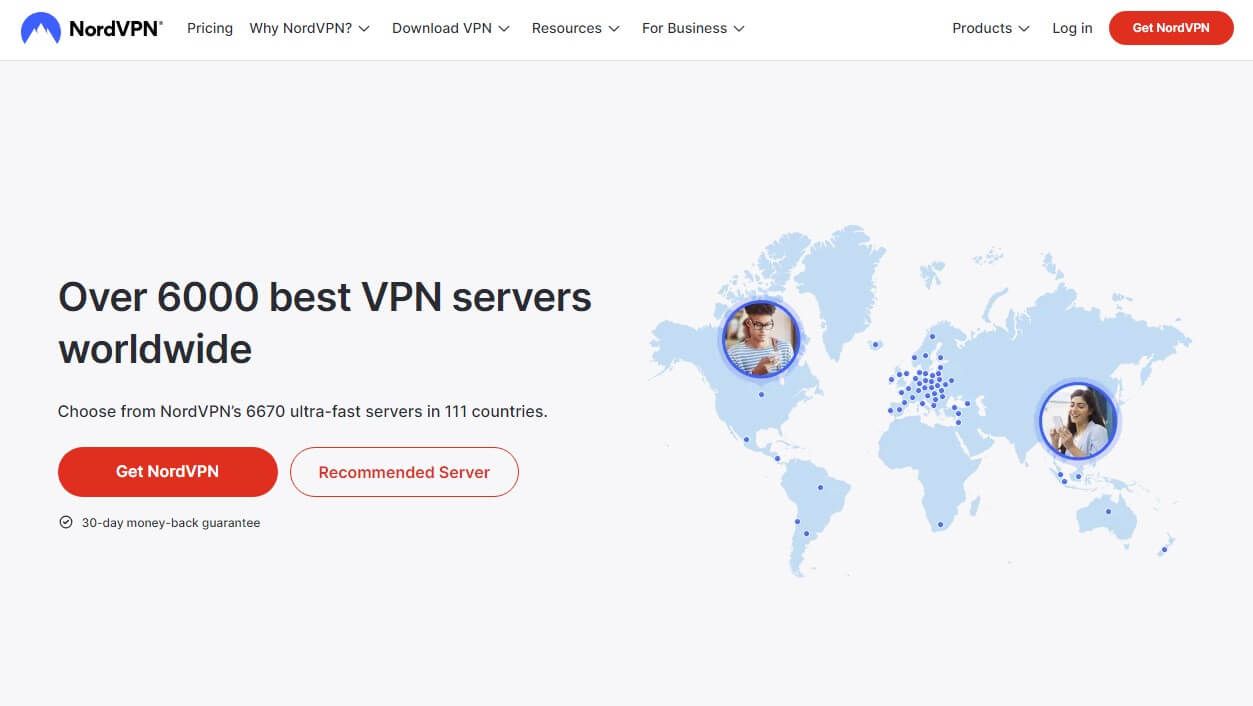
Pros
- Obfuscated servers to bypass censorship
- Malware and antivirus are included
- Above-average performance
- Has a proprietary NordLynx protocol
- Fast VPN for streaming and torrenting
- Meshnet allows for remote device control
Cons
- More expensive in some countries due to the VAT
- Windows users have seldom connectivity issues
NordVPN represents the best VPN for traveling overall, especially in terms of pricing, as it’s very low given its level of quality. This provider manages to stay relatively affordable, yet provides impenetrable security, blazing-fast speeds, and lots of features for seasoned travelers.
For the start, its server park counts 6,500+ servers in around 111 countries, which should be enough for most people. Moreover, NordVPN inserts some variety in the form of specialty servers such as P2P, Double VPN, and Onion over VPN servers.
I especially like their obfuscated servers that, thanks to obfuscation, manage to slip through the Great Firewall of China and bypass harsh censorship. Not only that, but the provider maintains solid performance despite the additional security measures – impressive!
NordVPN takes care of its users through the Threat Protection Pro system. It comes as standard with Plus/Complete plans, offering malware protection, antivirus, and Dark Web Monitor. On top of that, there’s a useful ad-blocker, which is a bit better than ExpressVPN’s offering.
I also like its ability to bypass geo-restrictions. NordVPN works with Netflix but you can use it to bet online abroad or access foreign TV channels anywhere. Its apps are modern-looking, and although not the easiest to use, you’ll get used to them pretty quickly.
Supporting all systems and platforms, NordVPN is no slouch. NordVPN’s apps are feature-rich even on macOS and iOS systems, where many other providers usually stumble. Overall, the provider is pretty reliable aside from a few connectivity issues on Windows.
Another issue with this provider also lies in its pricing. Value-added taxes increase the price a bit in some countries, so watch out for that. Even in this case, its 2-year plans are the cheapest deals on NordVPN and come with a 30-day no-condition refund period in addition.
Of course, you can get this deal below, so if you don’t mind a few minor flaws, this is surely among the best VPN services to have if you want to travel.
Stay Anonymous Online Abroad With NordVPN
2. ExpressVPN
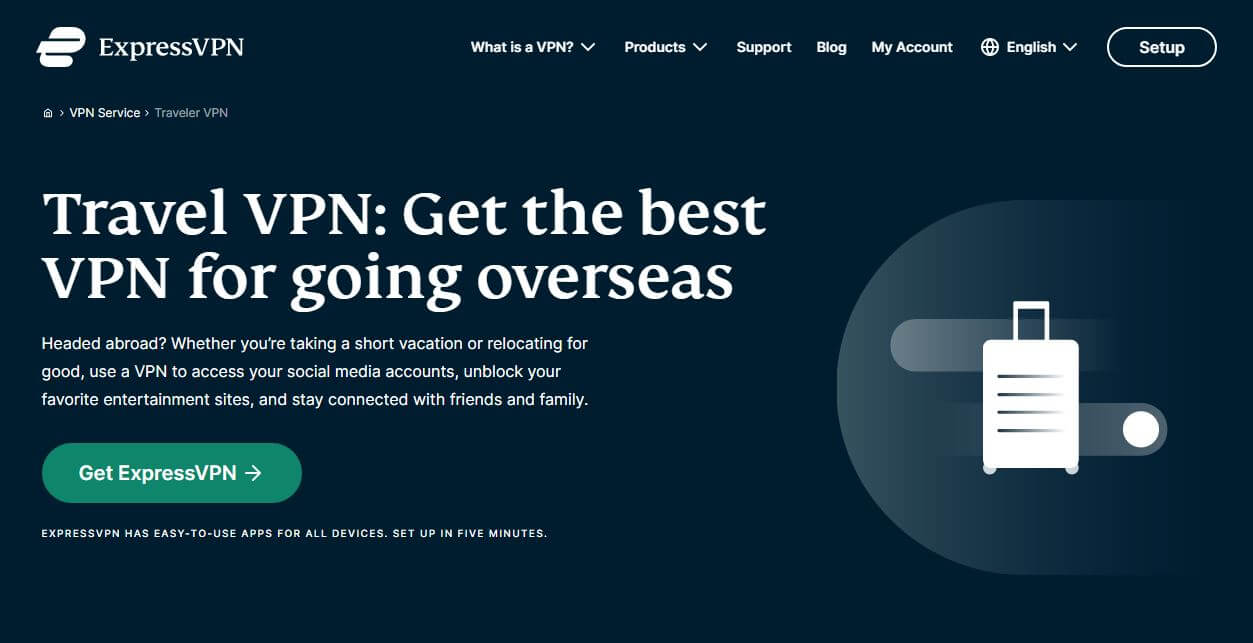
Pros
- 3,000+ servers in 160 locations
- Works with Netflix US, JP, CA
- Stores absolutely zero logs
- Lightway VPN protocol is very secure
- Works on all systems (iOS, Android, Windows, Mac, Linux)
- The fastest speeds
Cons
- It could be more affordable
- No Double-hop support
When venturing abroad to travel, I often use ExpressVPN as a reliable companion. It has 3,000+ servers in 160 locations globally, making it great for bypassing annoying geo-restrictions and surfing the internet with no limits.
Additionally, I find ExpressVPN’s performance more than sublime. With its fastest speeds and stable connections, you’ll never find yourself disconnected from the internet abroad. Another thing I value in ExpressVPN is how capable it is in terms of bypassing geo-blocks.
I mean, it works with Netflix, BBC iPlayer, and Hulu, which is great for streaming enthusiasts. On top of that, I love its ability to bypass censorship even in China, which is possible due to its obfuscation and the proprietary Lightway VPN protocol.
Since I touched on that, ExpressVPN offers a secure service, with 256-bit AES encryption and a top-grade kill switch for preventing IP or DNS leaks. A no-logs policy crowns its greatness, having an audit from one of the largest auditors on the planet – PricewaterhouseCoopers.
ExpressVPN’s overarching device compatibility is another factor. It works on all mobile devices, such as laptops, smartphones, and tablets, making sure you can use it on iOS, Windows, Android, macOS, and Linux. By the way, this is the best Android VPN app for me.
With 8 simultaneous connections, you can also protect multiple devices, just in case you’re carrying them on business trips abroad. ExpressVPN’s security will protect you on WiFi networks in restaurants, hotels, bars, and public places, too.
Therefore, using it guarantees total anonymity, along with the ability to battle any geo-restriction. Truth be told, ExpressVPN has no particular flaws (perhaps the lack of Multi-hop), but as one of the top VPNs for travel, its price isn’t the cheapest.
However, you can significantly lower it with a 48% discount and 3 months free for its annual plan. All plans come with a 30-day money-back guarantee as well, so you can get a refund after vacation if you don’t like it.
3. CyberGhost
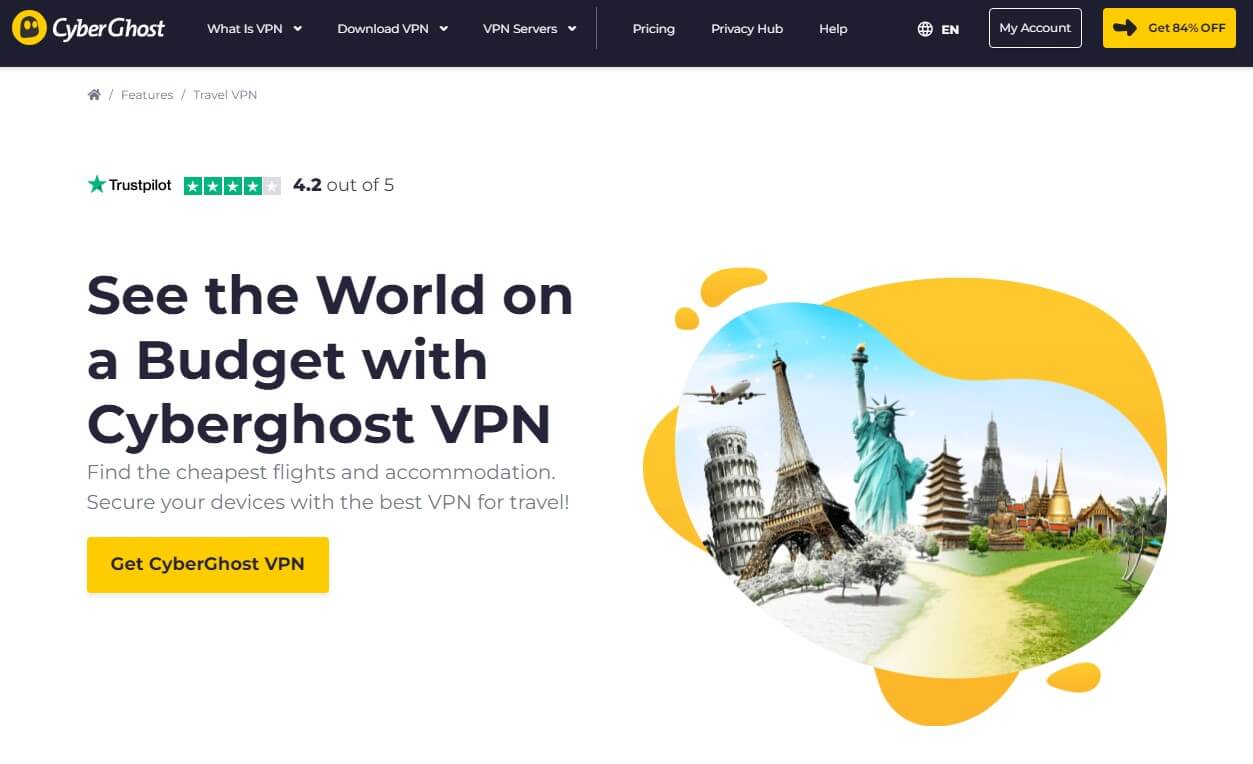
Pros
- 12,000 servers (including streaming/P2P servers)
- Very affordable 2-year plan
- Supports WireGuard
- 45-day money-back guarantee for long-term plans
- NoSpy servers for privacy-conscious users
Cons
- Poor choice for bypassing censorship
- The app on Windows could be more user-friendly
Another worthy VPN for travel comes at a cheaper price and it’s no other than CyberGhost. CyberGhost is extremely useful for traveling enthusiasts due to its humongous server fleet of 12,000 servers in 100 countries around the globe.
Mind you, this provider includes specialty servers for streaming and torrenting, expanding its usability further. With these servers, I had no issues accessing Netflix US abroad or watching Hotstar, HBO Max, or local TV channels outside of my country.
In addition, CyberGhost performs reasonably well, giving stable performance across the entire network. A part of that has to do with its WireGuard support but also the inclusion of OpenVPN as a true-and-tested protocol.
Security-wise, CyberGhost is only slightly inferior to NordVPN. It offers the good old 256-bit AES encryption coupled with an automatic kill switch, split tunneling, and an ad-blocker. The latter works well in preventing ads and pop-ups you often encounter.
A great traveling VPN like CyberGhost doesn’t fear getting more transparent. Thus, it publishes transparency reports every 3 months, which, coupled with its no-logging policy audited by Deloitte, gives this provider a “booster” dose of trustworthiness.
In my opinion, CyberGhost isn’t the most user-friendly on Windows. However, it does support all systems, and on iOS/Android, it’s extremely easy to use. This is very useful for enjoying CyberGhost on your phone while on a plane or a bus in another country.
Besides, it has 7 simultaneous connections – more than Mullvad’s 5, for example. The only bigger issue is that it isn’t great for bypassing censorship, so if you want to visit the Great Wall of China or the Forbidden City, you’re better off with NordVPN.
At least its 2-year plan is very cheap and comes with a 45-day money-back guarantee. So if you’d rather save a bit of money for your vacation and go for a cheaper VPN, this is the one to check out!
Get CyberGhost for Traveling Abroad
4. Surfshark
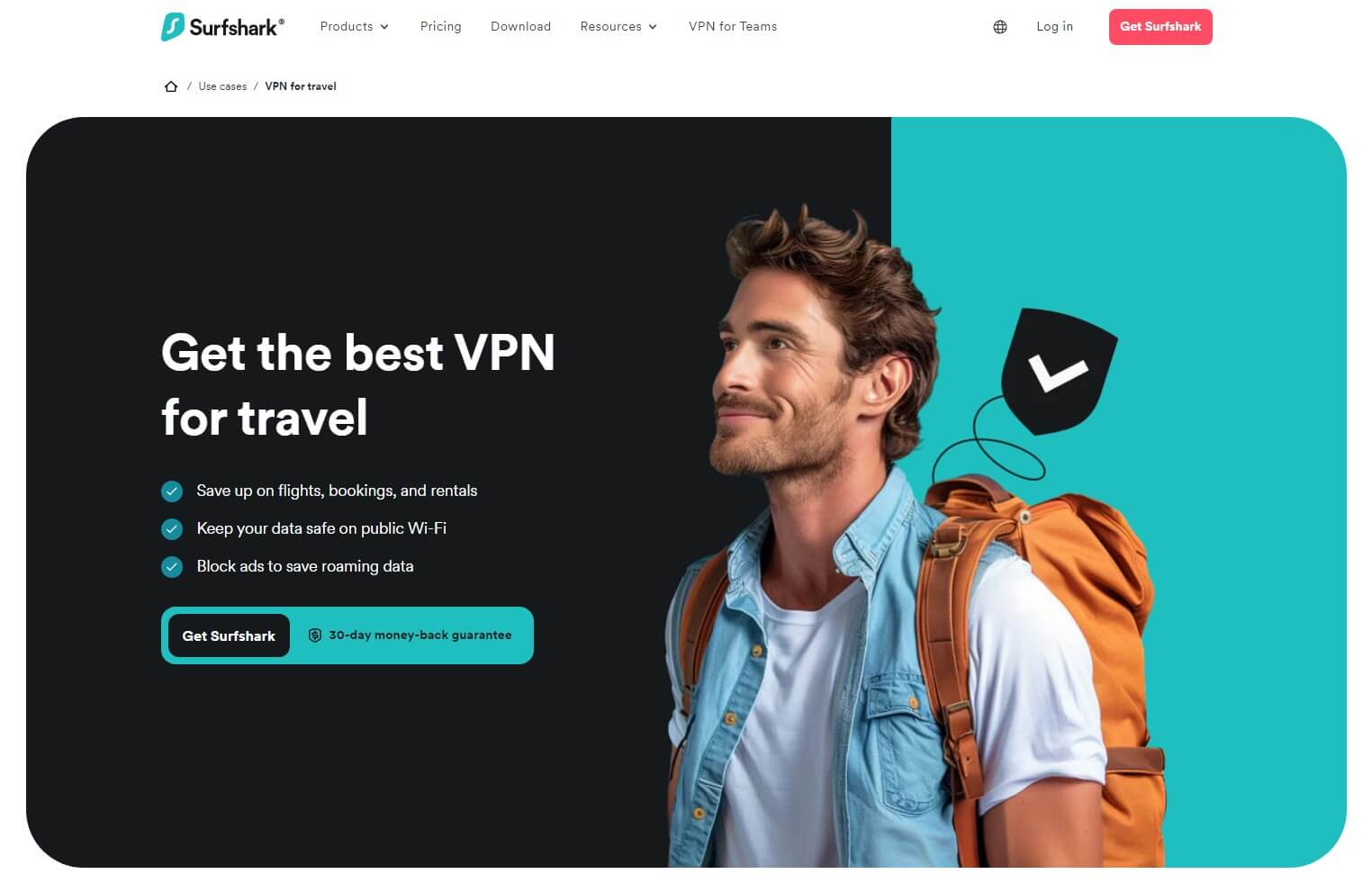
Pros
- 100 countries to choose from
- Very cheap long-term plans
- No limits on simultaneous connections
- Zero-logging policy
Cons
- Not the fastest VPN on the list
- Expensive monthly plans
Surfshark is a VPN that respects your budget and acts accordingly, which is great when looking for a VPN for traveling abroad. By that, we mean having a cheap price, and Surfshark’s 2-year plan is top-notch, costing below $2.2 a month and offering a 30-day money-back guarantee!
Despite its affordable price, Surfshark is extremely reliable and suitable for traveling. For one, it has 3,200 servers in 100 countries, so you get plenty of virtual locations to pick from. Second, unlike CyberGhost, it DOES work in China, thanks to the NoBorders mode.
It will obfuscate your VPN traffic and make it look like ordinary traffic, making sure you can get over the Great Firewall if you find yourself there. Surfshark offers the WireGuard protocol, which boosts your speeds, so 10 Gbps-level performance with solid stability is expected.
Streaming-wise, this service nails it. It’ll work with multiple Netflix libraries, foreign TV channels, and many other platforms. And if you want to access foreign betting sites or your local betting site abroad, this beast of a VPN will allow you to do that.
Surfshark is torrent-friendly and we like its MultiHop servers for doubling your encryption. This is backed up by an ad blocker, a kill switch, and even 256-bit encryption for fully securing your traffic. Even better is the fact that Surfshark comes with a no-logging policy.
It currently has two audits from PwC and Deloitte, which means you’re getting a trustworthy service. Surfshark is a great VPN for traveling, as it has unlimited connections per account. This means you can protect all your devices simultaneously, without additional costs.
And speaking of devices, it supports all platforms and systems under the Sun. You can, therefore, use it on your tablet, laptop, phone, desktop PC in your hotel room, and many other devices. All in all, Surfshark is impressively good, with a few minor flaws here and there – nothing too concerning!
5. Private Internet Access
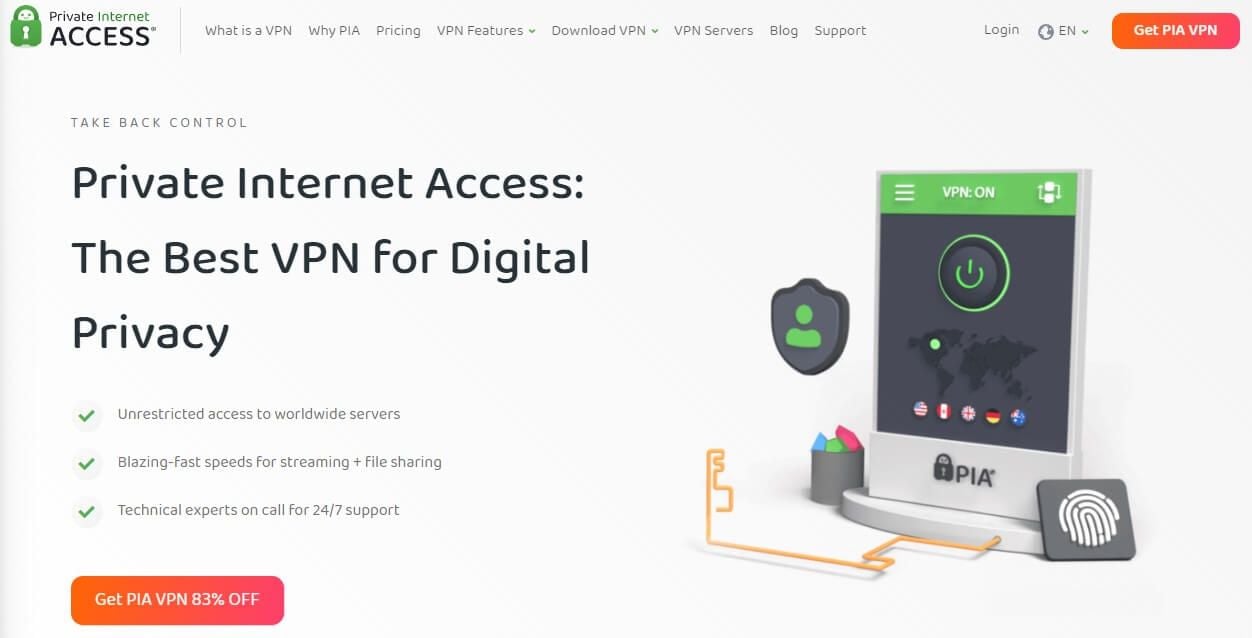
Pros
- 30,000+ global servers
- Military-grade encryption
- Dedicated servers for streaming
- Inexpensive 2-year plan with 2 free months
Cons
- It doesn’t work on Firestick natively
- Occasionally slow speeds
- Underwhelming VPN browser extensions
Our team values Private Internet Access and its 30,000+ servers in roughly 100 countries. It’s an ideal VPN for traveling across the world given its vast server fleet and ample security. PIA works on all devices, offering unlimited simultaneous connections for the best results.
You can also enjoy its WireGuard protocol, which ensures fast speeds and solid stability throughout. Private Internet Access rocks 256-bit AES encryption joined by Multi-hop to amplify your security and prevent tracking. We should mention PIA MACE too.
It blocks ads and malicious sites to keep things clean. PIA VPN is excellent for traveling if you care about privacy. There’s a no-log policy verified by Deloitte and proven in court a few times. If you’re worried about being able to download torrents, stop your worries now.
PIA is fully P2P-optimized on all 30,000+ servers. People who love streaming will appreciate its dedicated servers for this purpose. PIA works with Netflix libraries and makes unblocking BBC iPlayer or MAX abroad a breeze. Now, we said it offers no caps on concurrent devices.
However, you should be aware of its lack of the Firestick VPN client. If this bothers you, NordVPN is a better choice, alas, with 10 simultaneous connections. PIA works very well on iOS and Android, while its Windows app and its “clunky” nature can be a bit off-putting.
This is remedied by its price, which makes PIA one of the top cheap VPNs. Its best 2-year plan with 2 free months is now 83% off, costing only under $2.2 a month. At under $57 for the first 26 months, you’re getting one of the most reliable VPNs for traveling in 2025.
What About Free VPNs for Traveling Internationally?
When talking about paid VPNs, some of you will often come up with a question about their free alternatives. There’s a good reason why I presented premium providers and it lies in overall usability that free providers simply don’t have.
In a few points, I’ll explain why using a free VPN isn’t a very good idea when you travel:
They Won’t Work in Some Countries
First of all, I want to clarify that censored countries usually block VPN providers as well. Does that mean that not every VPN will work in China, Russia, or Iran? YES!
Free VPNs can never bypass harsh censorship measures in the aforementioned countries, which especially rings true in China. In this country, even a good portion of paid providers fail to work, let alone free VPNs that aren’t powerful enough.
If you want a serious provider for traveling internationally that’ll work anywhere, NordVPNis my recommendation.
Limited Bandwidth/Slow Speeds
Free providers tend to give you either slow speeds or limited bandwidth or both. Let’s not sugarcoat it – it’s usually both! With a few gigabytes of bandwidth a month and snail-like speeds, you aren’t going to get far in terms of streaming, torrenting, or browsing the web.
ProtonVPN, for instance, is a good free VPN for traveling because it offers unlimited bandwidth and rock-solid security. However, it has just 3 server locations, very slow speeds, and no P2P/streaming capabilities, so you always have to deal with some compromises.
Subpar Security and No Anonymity
It’s already known that free VPNs don’t care about your security. They do offer their services for free but the background is a bit different. When using them, they’ll have to store logs and collect your personal information to be able to sell it to third-party companies.
That’s the way they earn money. However, due to their lower budget, they also can’t afford better protocols and other important security features, which can result in frequent IP leaks that will ruin your privacy.
No Streaming Capabilities
Streaming with free VPNs is more of a myth than a possibility. In my experience, the best VPN for travel that is also free is never going to work with Netflix and other popular streaming services.
Free VPNs are easily detected by anti-VPN measures put in place by streaming sites, so in many cases, you can’t even access the site upon detection. Besides, their slow speeds and limited bandwidth already make them a poor choice for this purpose.
Conclusion
Having in mind VPN’s affordability and the ability to protect your privacy online, having one while traveling across the world is essential. This tool will allow you to bypass geo-blocks, stay safe online, and even save money on hotels and flights.
Our top recommendation is NordVPN since it’s the provider with pretty much no compromises, plus, even its price is very affordable. If you find it lacking, ExpressVPN is a great choice as well, and so are CyberGhost, Surfshark, and PIA which follow the more affordable route.
With everything said, you know what are the best VPNs for traveling in 2025 and I think it’s easy to make a choice. Now go get one and stay safe on your vacations – both physically and in the online world!
FAQ
Let’s now address a few important questions about the best VPN to use when you travel around the globe:
❌ Will a VPN for traveling let me eliminate roaming charges?
Unfortunately, no – it won’t. Your phone operator will still see the physical location of your phone and base its roaming charges on that, so a VPN won’t help in this case.
? Should I use a VPN in a hotel?
Yes, you should. Although hotels have passwords on their networks and they seem safe, you never know who is the administrator of that network. After all, hotels also make deals with ISPs, so you’re still under their surveillance even when in a hotel.
When traveling, it’s best that you use a quality provider if you want guaranteed privacy and security regardless of where you’re located.
✈️ How to use a VPN when traveling?
Well, just connect to a server and that’s all! I recommend getting a VPN subscription before you initiate your journey, though. You never know if a VPN site will be available in the country you’re visiting, so in some cases, you might not be able to get a subscription at all.
This is true in China, for example, where VPN sites are blocked and it’s extremely hard, if not impossible to purchase a subscription. However, if you get a subscription in your home country, install the app on your devices, and sign in, you set yourself up for success. Once you venture abroad, just open the app, choose a server, and you’re good to go. For more details, read the article on how to use a VPN.